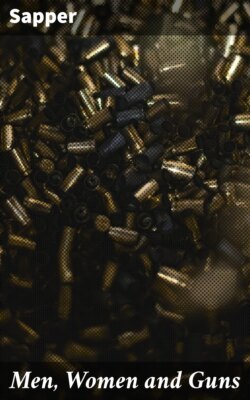Читать книгу Men, Women and Guns - Sapper - Страница 7
На сайте Литреса книга снята с продажи.
* * * * *
ОглавлениеTable of Contents
At 3 p.m. on April 22nd Dick O'Rourke received a wire. It was short and to the point. "Leave cancelled. Return at once." He tore round to Victoria, found he'd missed the boat-train, and went down to Folkestone on chance. For the time Moyra was almost forgotten. Officers are not recalled from short leave without good and sufficient reason; and as yet there was nothing in the evening papers that showed any activity. At Folkestone he met other officers—also recalled; and when the boat came in rumours began to spread. The whole line had fallen back—the Germans were through and marching on Calais—a ghastly defeat had been sustained.
The morning papers were a little more reassuring; and in them for the first time came the mention of the word "gas." Everything was vague, but that something had happened was obvious, and also that that something was pretty serious.
One p.m. on the 23rd found him at Boulogne, ramping like a bull. An unemotional railway transport officer told him that there was a very nice train starting at midnight, but that the leave train was cancelled.
"But, man!" howled O'Rourke, "I've been recalled. 'Tis urgent!" He brandished the wire in his face.
The R.T.O. remained unmoved, and intimated that he was busy, and that O'Rourke's private history left him quite cold. Moreover, he thought it possible that the British Army might survive without him for another day.
In the general confusion that ensued on his replying that the said R.T.O. was no doubt a perfect devil as a traveller for unshrinkable underclothes, but that his knowledge of the British Army might be written on a postage-stamp, O'Rourke escaped, and ensconcing himself near the barrier, guarded by French sentries, at the top of the hill leading to St. Omer, he waited for a motor-car.
Having stopped two generals and been consigned elsewhere for his pains, he ultimately boarded a flying corps lorry, and 4 p.m. found him at St. Omer. And there—but we will whisper—was a relative—one of the exalted ones of the earth, who possessed many motor-cars, great and small.
Dick chose the second Rolls-Royce, and having pursued his unit to the farm where he'd left it two days before, he chivied it round the country, and at length traced it to Poperinghe.
And there he found things moving. As yet no one was quite sure what had happened; but he found a solemn conclave of Army Service Corps officers attached to his division, and from them he gathered twenty or thirty of the conflicting rumours that were flying round. One thing, anyway, was clear: the Huns were not triumphantly marching on Calais—yet. It was just as a charming old boy of over fifty, who had perjured his soul over his age and had been out since the beginning—a standing reproach to a large percentage of the so-called youth of England—it was just as he suggested a little dinner in that hospitable town, prior to going up with the supply lorries, that with a droning roar a twelve-inch shell came crashing into the square...
That night at 11 p.m. Dick stepped out of another car into a ploughed field just behind the little village of Woesten, and, having trodden on his major's face and unearthed his servant, lay down by the dying fire to get what sleep he could. Now and again a horse whinnied near by; a bit rattled, a man cursed; for the unit was ready to move at a moment's notice and the horses were saddled up. The fire died out—from close by a battery was firing, and the sky was dancing with the flashes of bursting shells like summer lightning flickering in the distance. And with his head on a sharp stone and another in his back Dick O'Rourke fell asleep and dreamed of—but dreams are silly things to describe. It was just as he'd thrown the hors-d'oeuvres at the head-waiter of Ciro's, who had suddenly become the hated German rival, and was wiping the potato salad off Moyra's face, which it had hit by mistake, with the table-cloth, that with a groan he turned on his other side—only to exchange the stones for a sardine tin and a broken pickle bottle. Which is really no more foolish than the rest of life nowadays...
